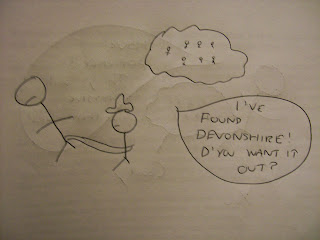Hello! How are you? Oh, it’s so nice to see you, funny-cheeks. What an adorable coat! Is that sheepskin? Anyway, come in, come in! Come sit by the fire as I tell the long and boring tale of a year in the life of Mark Jezebel Nicholls: writer and moocher extraordinaire.
2009, the hallowed year of our Lord Jezziebum, was the year I stepped from the closet of obscurity and began my attempt to get my writing out there into the world. Here is a boring recap (for my own benefit) of my progress, purely as a self-evaluatory exercise. For everyone else, there will be pictures of pies, squirrels, and cute doctors and nurses throughout.
Jan-April:
I began the year one third of my way through a novel as part of a rare and brilliant workshop. I was immersed in this for the first few months until the group fell apart and three or four of us ended up with marketable works of über-proofread genius. A great experience, and I doubt I’ll find another semi-punctual workshop in the near or far-off future.
So, once the novel was finished, I raided my backlog of stories and sent a cache of cock to a slurry of e-zines and magazines. I sent, sighed, and went to hide under my bed.

May:
The first thousand rejections poured in. I took them all personally. Every “not right for us” made me feel like a child excluded from the cool kids gang. I felt like a pauper holding out his tin cup and rattling it in the pissing rain. I felt like a toddler wetting himself as the girls looked on sniggering. Actually, that last one was a fantasy. Ignore that.
Even small ‘indie’ e-zines felt like unconquerable domain. I began a long hate-hate relationship with these places, merely through my searing desire to be acknowledged as NOT SHIT. This still lingers, though I approach this disdain with a healthier slice of irony.
I had some incredible luck with Cantaraville, who took a story I had written in June 2008 when I was living in Inverness cleaning my girlfriend’s school (very convoluted story).
More fortuitously, they offered to print a bundle of my older stories in an e-book format. When I heard this, this spark of cynicism I had died and I gained FAITH that I could get work out there without performing sex acts on editors. It’s amazing how modest successes can bolster a writer’s confidence. Even better, I GOT RID of all those stories. The clutter was gone! Hurrah!
June:Having finished one novel, I cranked out some more short stories. Several of these were abominations, others were unreadable goulash, and others were amazing fun to write. The stories I adored writing attracted the most attention – the Modern Narratives – which was another boost. If I could write AND partake in pleasure: double bonus.“A Modern Narrative [1]” ended up at Piker Press, but later that month, I had a few other responses from mags interested in it. Frustratingly, these mags were unresponsive to my offer of an alternate piece (the second in the series).One magazine didn’t respond to my private e-mails at all (I won’t name it – oh, OK: The Cynic Mag) and so I ended up keeping my piece at Piker. Which turned out to be the right choice, as the staff there are splendid funsters, and have let me build a series there.
July:
I decided that short stories were fun, but I preferred writing longer material. The freedom to leap around the place, squirrel-like, was invaluable. I began a strong hate campaign against microfiction, losing multiple internet buddies, and began a second novel project.
I was also, at that time, out of cash-earning work. So, like every good student who doesn’t want to have to get a job, I enrolled in another university course. I struck gold when I discovered a new course starting that had a focus on experimental literature, with a fresh and zestful outlook. Yes! So I applied, mumbled through the interview, and was accepted.
Good things. If this sounds overly self-congratulatory, bear in mind that at this time I was also in the grip of a horrible writer’s block, almost lost my entire computer contents to an internal death, and was published in the Drabbler. I mean… eugh. The Drabbler.

August:
The hottest month of the year means sunlight blocks my computer screen. I can’t blot it out with dark curtains. It melts through curtains. It melts me. It hurts. So writing is hard.
I didn’t write much. I ate lollipops, did one or two chapters here and there, and took money off the government.
Good news came later that month when I found a publisher taking a positive interest in my novel. But more on that later. That’s an ongoing nightmare that I might blog about one afternoon when I'm old, o'er the hill and dribbling into my Corn Flakes.
More to come.
P.S. This was written at 500MPH, so excuse the quality.

























